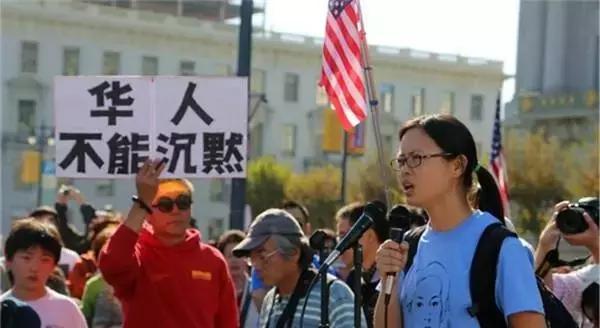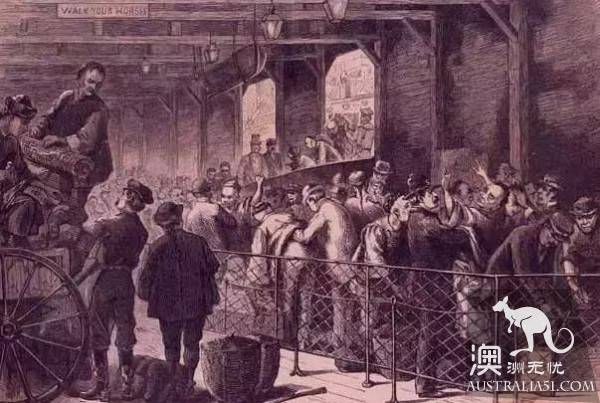Recently, far-right forces such as white supremacist, anti-Muslim and anti-immigrant groups have been active in North America. Although this appears to be an "internal affair" in the Americas, the discrimination and xenophobia shown by far-right activities are closely related to every Chinese in our country.
In fact, there are more and more signs of recent discrimination against our Chinese community across North America. On the American subway, for example, a man mistook a woman as a Chinese American and scolded "get out of my country, don't wait for me to kill all of you." Earlier in a McDonald's in New York, there had been an American old lady who wouldn't let Chinese students sit in chairs and shouted, "We Americans only have the right to sit."
Canadian society has a high degree of acceptance of immigrants, discrimination against Chinese is much better than that of the United States, but there have also been some incidents of discrimination. Late last year there was an incident of discrimination against Chinese in Richmond, after a few weeks ago the SUV car, a veteran Chinese immigrant in Toronto, was sprayed with the word "Chinese roll back".
The phenomenon of "discrimination" can not be avoided anywhere. At home, we have geographical discrimination, gender discrimination, work discrimination, belief discrimination, and may encounter the most obvious racial discrimination abroad. So today, let's sum up what North American English says about discrimination against Chinese and Chinese. When we hear these statements in the future, we should directly attack them back!
Discrimination in English

Chinaman
Literally, China is "China", "man" is human, it seems to be "Chinese" after synthesis, but in fact it is a word with provocation and racial discrimination. Similar to the English term "N-word" for African-Americans, it is an American native language of discrimination. Today, it's not just discrimination against Chinese Americans in the United States, it's sometimes used against other Asian-Americans, and those on the far right also use it. According to the word, some stereotypical discriminatory slang has been developed, such as Chinaman's chance.. Literally, it means "opportunity for the Chinese." it actually means "chances are very slim."
Oriental
The original meaning meant that there was no discrimination in the normal use of the East, but if it was used to refer to people, especially against Chinese and Chinese, that would be typical discrimination. Because this word is specific to describe the geographical features of the East inanimate objects. For example, Oriental carpe refers to the oriental carpet, which is the right way to use it.
Chinky
According to the Chinese (chinese) in English, one of the discriminatory special terms, is the meaning of the Chinese. Many discrimination terms for other ethnic groups in English are similarly rewritten in the original formal vocabulary.
Banana/yellow monkey
Banana refers to many Asian Americans who are accustomed to a completely westernized life and blend in white culture, but are still naturally yellow-skinned. The word presupposes that everything is the best white, and even if Asians kneel and lick white culture and language, you won't get white skin. Banana has a few variations: Bananame, for example, refers to the Asian people who are the only Japanese culture to look forward to; Peeled Banana, for example, refers to; Yellow Monkey, an Asian who works hard to learn Western culture and "tries" to blend in, referring to the thin Asian boys.
Honky/Honkie
Hong Kong guys. A disparaging term for Hong Kong people.
Chow
Black-nosed dogs, Chinese dogs, mean to insult the Chinese on certain occasions or situations, such as: Hello Chow is "Hello Chinaman."
Discrimination on the basis of Chinese language development

Ah Tiong
This word comes from the Chinese pronunciation of "A Zhong", which is simply a disdainful address to the Chinese people and Chinese.
Dim Sum
According to the heartthrob pronunciation, because of the early Guangdong Chinese in the United States to make Guangdong morning tea snacks many people.
Manzi
According to the Chinese pronunciation of "barbarians", white people one of the disparaging names of the Chinese.
ching chong、pingpong、tingtong
Literally there is no special meaning. They are mimicry words that are imitated from the Chinese pronunciation, which is used to discriminate and ridicule the Chinese and Chinese.
Coolie
It may be pronounced from the word "hard labour", referring to the unskilled Asian labor (unskilled Asian labour), from 19th-century Chinese railway labourers. It is also a disparaging term for people in India and the Caribbean. The degree is similar to that of nigger.
Discrimination based on appearance
Chink
The original meaning is "crack", English expression and "slanteyes" (squinting eyes). This discriminatory use of the source speculation is more, some believe that because the Chinese are generally small eyes, only one seam, so the use of "cracks" to discriminate. Some people think this is a clear word from the Qing (Qing) dynasty in China, while others think it evolved from the Indo-European language of China (such as the French word La Chine). The American slang Chink in the Armor, made up of Chink, literally means "Chinese ghosts in armor," and is actually used to describe "someone's weakness."
Discriminatory claims from eye shape are also: slant (squint), coin slot (moneyhole), slot machine (coin machine), two strokes (two strokes and so on.
Bed time
Literally, the time to sleep, a discriminatory term for being Chinese or Chinese is also used to describe Asians with small eyes and can't open, as if they were going to fall asleep.
moon-eyed leper
Literally, eye leprosy is a discriminatory claim based on the American belief that Chinese are small-eyed and ill-health. A similar combination of words yellow-belly (yellow belly).
zipperhead
Zipper head. Whites also think that Chinese people have small mouths and laugh like a zipper. Can be abbreviated to zipper (zipper) and zip (shut up).
Panface
Flat face. The faces of the Orientalists are not as ups and downs as those of the Europeans. Synonymous with table face (flat face), panhead (big flat head), pancake (pancake and so on.
Discrimination based on the context of cultural life
Do my math homework
If someone teases you to help him with his math homework, don't think he's asking for your help! Mathproblem (Mathematics problem), generally said that the Chinese are nerds, can only learn.
Dog eater
Because they remember that Chinese people eat dog meat as a sign of Chinese backwardness and barbarism.
Red Monkey
Red monkey, exactly why say red, according to the relevant law does not show. You know。
Baby-muncher
Eat babies. They said they insulted the Chinese by saying that when they were the poorest and most famine in China, they liked to eat easily.
Bruce Lee
Bruce Lee refers to Li Xiaolong, similar to Jackie Chan (Jackie Chan), Jeremy Lin (Lin Shu-how), why is using the name of a celebrity to refer to a specific person is discriminatory? This should be judged by context. In English it is often ironic that Asians look the same.
There are so many discriminatory theories about Chinese and Chinese in English, what if we really encounter these situations in North America? According to Canada's compulsory reading, there is still a need to look at it in a different context:
1, if you are in a company, school, meet the discrimination of co-workers and classmates, you just say "you are racist" out loud. In any case, North America as a whole is politically correct, and those around you will look at discrimination differently. Over time, no one will deliberately make these discriminatory remarks against you.
2. If you encounter these discriminatory claims on the streets of the United States, you need a specific analysis of the situation. After all, some parts of the United States do not have good law and order, and we should be timid or timid when we encounter things. If it is in some safe place, it can be directly dished back.
3, if you are in a public place in Canada, such as shops, supermarkets, hotels encounter these discrimination, do not worry about it, directly call the police. Canada has legislation on racial discrimination, and the Human Rights Court will deal with such cases. The shopkeeper may have to shed blood to compensate you for a large amount of loss.
Finally, there are times when discrimination is not expressed in the form of language. On the road to equal treatment for others, we Chinese have a long way to go.